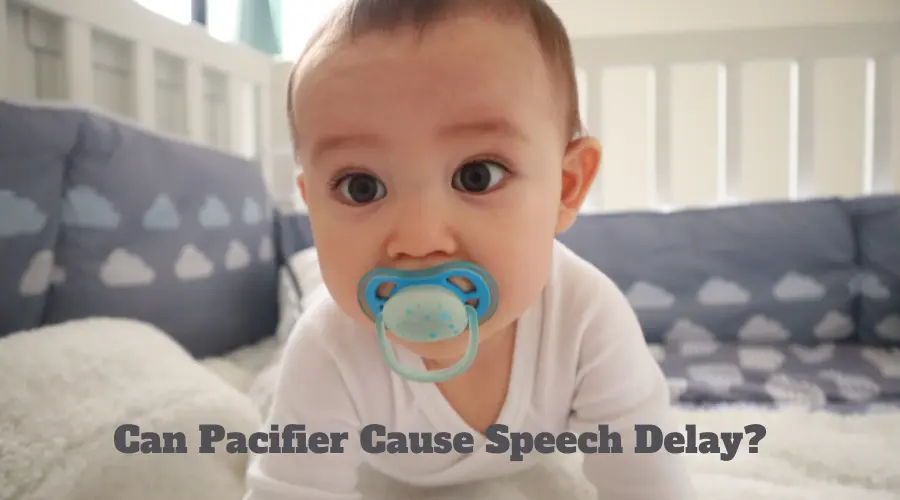Are you considering using a pacifier with your baby? While pacifiers can offer some benefits, such as reducing the risk of SIDS and satisfying a baby’s instinct to suck, there has been some debate about whether they can cause speech delay.
In this article, we’ll explore whether pacifiers can cause Speech delay, as well as the advantages and disadvantages of pacifiers and strategies for weaning a child off of them.

Let’s get started!
Can Pacifier Cause Speech Delay?
Prolonged overuse of Pacifiers in an improper way can cause speech delay. While some studies state that pacifiers have no adverse effect on speech delay, a few works have blamed the inappropriate use of pacifiers for speech delay.
Impact of Pacifier Use on Child’s Speech(According to Research)
A study by Charlie Strutt, Ghada Khattab, and Joe Willoughby found no association between the use of pacifiers and speech outcomes.
They stated that nothing, be it the duration or frequency of pacifier use, negatively impacts a child’s speech development. Also, Laura L. Shotts, D. Mike McDaniel, and Richard A.
Neeley found no significant differences in child’s articulation between the group of children who have been using pacifiers and those who do not. Similarly, Charlie Strutt, Ghada Khattab, and Joe Willoughby concluded that using pacifiers does not adversely affect a child’s speech.
Contrary to these results, the study by Antonia M. Nelson finds the use of pacifiers controversial.
When should I stop using pacifiers for speech?
Doctors and speech pathologists recommend stopping pacifier use by 12-18 months of age.
American Dental Association (ADA) suggests parents stop offering children pacifiers by age 2. Further, the American Academy of Pediatric Dentistry (AAPD) recommends halting nonnutritive sucking habits before 36 months.
Advantages and Disadvantages of Pacifiers
The American Academy of Pediatrics highlights one advantage of pacifiers: lowering the risk of Sudden Infant Death Syndrome (SIDS).
It highly recommends the use of pacifiers while putting the baby to sleep. However, they warn about using pacifiers when the baby has fallen asleep, as it may choke the infant.
Another advantage of pacifiers is that it satisfies the baby’s instinct to suck between feedings. It keeps the baby calm and soothed. Some families use pacifiers to discourage a child sucking their fingers or thumb.
Some studies have found positive effects of pacifier use on mothers suffering from postpartum depression. Taking care of a newborn is extremely challenging for moms under the influence of postpartum depression.
The pacifier gives new mothers relief and rest by keeping the baby busy. Also, pacifiers can be a distraction during a child’s vaccination.
The first disadvantage of pacifiers is that they can make a child addicted. This is because pacifiers give a child the feel-good effect of sucking even when not fed. This feeling may become a habit, and the child may not be willing to let go of it.
Some physicians relate pacifier use to middle ear infections.
There can be two ways such infection can occur.
First, it can happen due to the change in the pressure behind the ear when a baby sucks and swallows, and second, the pacifier may contain germs that can infect the stomach and ear.
Moreover, the prolonged use of pacifiers inside the baby’s mouth can be another cause of such infections.
Another most important disadvantage of pacifiers is that they may lead to dental problems in the long term.
Some studies have shown that pacifier use affects the shape of the teeth and the mouth if used for a long time. Constant use of pacifiers can also cause problems like cross-bites or overbites.
How to take the pacifier Off my child?
Pacifiers offer children a lot of comforts. Hence, weaning it off may not always be an easy thing to do. However, parents can try the following strategies to take pacifiers off their children.
Choose the right time
Don’t allow your child to use the pacifier for too long. As your child crosses the age 1 or 1.5 years, you should slowly discourage the use of pacifiers. Adopt a slow and steady approach and be patient with them.
Given them an alternative object of desire
You can distract them with a toy, a stuffed animal, or a blanket that can replace the pacifier. It will give the child the same level of comfort but will not form a habit.
Curtail its use
Do not allow your child to have the pacifier during day time. If you think they cannot sleep without it, you can offer them at bedtime but for a limited time. It is best to phase out its use than stop it abruptly.
Motivate your child to refrain from using pacifiers
You can tell them that pacifiers are for toddlers; since they have grown big, it is not for them. Also, you must praise them or reward them when they do not use pacifiers.
Conclusion
Let’s conclude the post on whether Pacifiers can cause speech delay!
As a takeaway, consult with a doctor when to stop pacifier use and follow their recommendation.
What’s Next? You May Also like to read these posts related to Pacifier:
- Why does my baby gag on Pacifiers?
- Should I remove Pacifier when my baby is sleeping?
- How to get a baby to sleep without a pacifier?
- Do Pacifiers Affect Teeth?
I hope you found this post helpful and to read more and explore more on this, here are the references used below to write this post.
